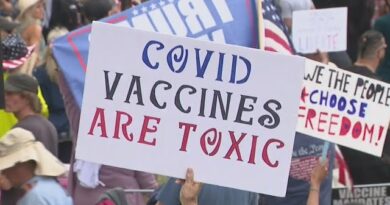NIH director asks Americans to leave ‘conspiracy theories’ on vaccines behind and ‘look at the facts’
WASHINGTON — Dr. Francis Collins, the director of the National Institutes of Health, made a direct appeal to Americans Sunday to “hit the reset button” on skepticism of approved Covid-19 vaccines, stressing that the independent nature of the approval process and the strong safety measures that should give the public confidence.
In an interview with “Meet the Press,” Collins said that mistrust of vaccines continues to be a source of great concern public health officials, insisting that anyone who wants to “look at the facts” surrounding the vaccine’s development, testing and safety record should “be very reassured.”
“I would like to plead to people who are listening to this this morning to really hit the reset button on whatever thy think they knew about this vaccine that might cause them to be so skeptical. The data is out there now,” he said.
“This is a very powerful outcome of this incredibly intense, yearlong experience, to develop this. I think all reasonable people — if they had the chance to put the noise aside and disregard all those terrible conspiracy theories — would look at this and say: I want this for my family, I want it for myself. People are dying right now, how could you possibly say let’s wait and see if that might mean some terrible tragedy is going to befall.”
The Food and Drug Administration authorized the Pfizer Covid-19 vaccine for emergency use in the United States on Friday, making it the first vaccine to receive that status in the country.
The vaccine began being shipped Sunday morning, with some vaccinations beginning early this week.
Pfizer’s Phase 3 trials found its vaccine to be 95 percent effective when given in two doses, three weeks apart. It also found that only one shot provides about 50 percent immunity from Covid-19, although the FDA says two shots are necessary.
The Pfizer vaccine has already received some form of use authorization in the United Kingdon, Canada and Bahrain. And more vaccines are already in the latter stages of development.
But for months, polling has shown that a significant portion of America is skeptical about getting a Covid-19 vaccine themselves.
President Donald Trump has sought to take credit for the vaccine’s quick and effective development. And he’s put pressure on public health officials to approve the vaccine for widespread use. For example, ahead of the FDA’s approval announcement on Friday, Trump tweeted that FDA Commissioner Stephen Hahn should “get the dam (sic) vaccines out now” and “stop playing games and start saving lives.”
When asked whether rhetoric like that has contributed to the public sentiment about the vaccine, Collins replied “I think that is part of the skepticism, along with a lot of other things that reflect the terrible polarization we have in this country about absolutely everything.”
“There have been few if any vaccines, that have ever been subjected to this level of scrutiny. If you want to look at the facts, I think you should be very reassured,” Collins said.
“Put aside all of the noise and, yeah, all of the skepticism that’s born of potential interference from some source or another. That did not determine the outcome, this was based upon scientific decision-making.”
As the vaccine is sent out across the country for initial inoculations, Covid-19 cases, hospitalizations and deaths continue to soar in America.
There are currently more than 108,000 people in American hospitals with Covid-19, according to the Covid Tracking Project, as current hospitalization numbers have continued to rise each of the last seven days.
There were more than 210,000 new cases in America on Saturday, with three states (Delaware, South Carolina and West Virginia) setting new, single-day case records. And there were 2,376 deaths attributable to the virus on Saturday, with Alaska and Massachusetts setting daily death records, according to NBC News analysis.
It’s against that worsening backdrop that Collins said widespread vaccination will be so important.
“It’s going to depend on the American public quite a bit in terms of whether people are willing to take part in this immunization plan,” he said.
“The experts would say we need 70-80 percent of Americans to be immune before this virus will basically give up and it will be gone. And we think we can get there by June or so for almost all the 330 million Americans interested in getting this vaccine. But if only half of them do so, this could go on and on and on.”
And he noted that while it’s clear the vaccine provides people with strong protection from a symptomatic Covid-19 infection, scientists still need a few more months to learn whether a vaccinated individual could still spread the infection to others without knowing they have it.
That’s why Collins said masks will still need to be an essential part of American life for months more.
“Masks are still going to be part of our life, we need to recognize that and not step away or drop our guard,” he said.
“We’ve got to absolutely double down on all the things Americans can do to save lives, and look at the lives that we have lost and the tragedy that is there. If we have a chance to make these next few months, which otherwise could be very dark, just a little bit better, why wouldn’t we do that?”



